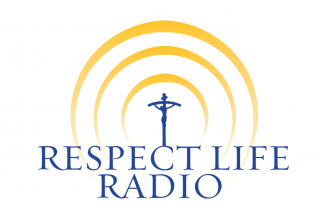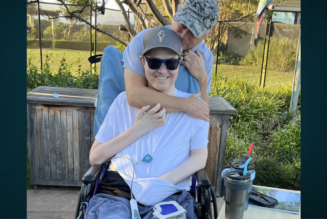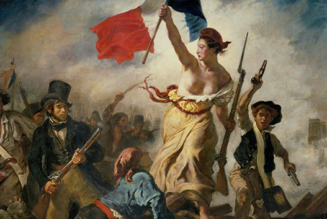Here is the point: it is likely true that I provided her with a lot of content that helped her in her future classes, and perhaps even a bit of the foundation she needed for graduate studies, but she would have likely not received those things if for some reason, despite my many failings, she had not entrusted me with the ability to teach her. This story could be told by almost any teacher who has had the opportunity to connect with the students they serve. Yes, delivery of content and assessing students’ reception of it is important; much of my academic career has focused on these realities. But it seemed to me in that moment that the foundational aspect of learning is built much more on relationship and the truth of what is being communicated, than on just its efficient delivery. As I boarded my flight, I reflected on the words of John Henry Newman’s motto, “cor ad cor loquitur” (heart speaks to heart), and on what education is and what it is not.
Education is Corporeal
While it is possible to learn in an asynchronous, isolated, virtual environment, our brains prefer to learn in real-time, with others, and from a flesh-and-blood person. This fact has been proven through multiple cognitive studies, and likely through your own direct experience. We learn better when in contact with the material and with the people teaching it. This fact means that teaching is often terribly inefficient, both in-person and online. It takes time to learn things, and it also takes an act of the will to devote our intellect or at least allow it to engage with and learn the subject. Because learning involves the will, the act of learning will always require more than just intellectual cognition.
Although we have certainly learned some things by accident, and others through force, education in a formal setting should not require either. In fact, nearly all virtual and remote education becomes an attempt to overcome the fact that our brains just don’t show up as well when what we are doing is somehow removed from reality, even partially. 
 Our bodies and our presence make a difference to how we engage reality and how we learn. Whether it is math, science, history, or other worthy subjects of study, we come to learn them and believe in their veracity not just by receiving the data but by learning what that data means when applied to our lived experience of reality. Because education is incarnational, real learning involves not just the intellect, but the whole person. This is why Cardinal Newman would say in opposition to the thought of Locke and his contemporaries, “The heart is commonly reached, not through reason, but through the imagination, by means of direct impressions, by the testimony of facts and events, by history, by description. Persons influence us, voices melt us, looks subdue us, deeds inflame us. Many a man will live and die upon a dogma: no man will be a martyr for a conclusion.”
Our bodies and our presence make a difference to how we engage reality and how we learn. Whether it is math, science, history, or other worthy subjects of study, we come to learn them and believe in their veracity not just by receiving the data but by learning what that data means when applied to our lived experience of reality. Because education is incarnational, real learning involves not just the intellect, but the whole person. This is why Cardinal Newman would say in opposition to the thought of Locke and his contemporaries, “The heart is commonly reached, not through reason, but through the imagination, by means of direct impressions, by the testimony of facts and events, by history, by description. Persons influence us, voices melt us, looks subdue us, deeds inflame us. Many a man will live and die upon a dogma: no man will be a martyr for a conclusion.”
Despite the gross inefficiency of most staff meetings, whether I like to admit it or not, being with other human beings, not just videos of their heads, makes a big difference. Said by a colleague another way, “It ends up wearing pants to a meeting is pretty helpful.” So too, the corporeal reality of education means that being present to others, and to a teacher, helps you be present to what you are learning.
Education is Communal
While life’s most important lessons are learned interiorly, they are not learned in isolation. That is, they are not learned removed from the people, or the context in which they often matter most. The luminaries of modern education — despite their tendency to unmoor education from the good, true and beautiful, preferring practical above meaningful things — never once sought to disconnect learning from the community. In addition to the incarnational nature on which the teacher–pupil dynamic depends, so too does being in a group of people assist the learning process. Not only is there evidence that it helps retention, but it broadens perspective, as the questions and insights of others add context and contour to the learning. While self-motivated learners can often receive and imbibe the content on their own, applying what they have learned often requires interaction with others. This interaction includes the critique and support from their peers, not to mention the fine tuning and affirmation from teachers and mentors. This is especially true in the practical arts and sciences. While I may accept a self-made mathematician or self-taught historian, I don’t prefer either a self-made nor self-taught medical doctor. As the learned Ethiopian asks Phillip while leaving Jerusalem “How can I understand unless someone teaches me?” Even the protagonists of Dostoyevsky novels recognize the importance of the community despite how obtuse or unengaging a particular community might be.
Education is Student Centered
There is much to be said about developmental and cognitive psychology, as well as neurobiology and the way in which our brain receives, acquires, stores and uses data. However, the mechanics of learning and retention are not one-size-fits-all. Perhaps not even a one-size-fits-many. We share many things in common: we all have bodies, and we all have souls — or minds if you prefer the ancient Greek way of seeing things, or hearts if you prefer a more modern sentiment, or to be secular friendly, higher-order consciences. Our physical nature, which allows us to see and perceive as well as contemplate and willfully accept or reject information or stimuli, means that certain aspects of learning are the same for everyone, or at least for most. We take in data from our senses, we consider our own experiences, we weigh the credibility of our teacher, typically all through similar neurological processes particular to how our brains work. Things like temperament, however, particulars of character, innate or learned interests, emotional intelligence, cognitive ability, sensory preferences etc., as well ethnic and cultural traditions and expectations for age, sex etc., all play an important role in how a student as an individual learns. Good teachers can speak to the particulars of the student without abandoning the universals that we all share as humans.
Join Our Telegram Group : Salvation & Prosperity







